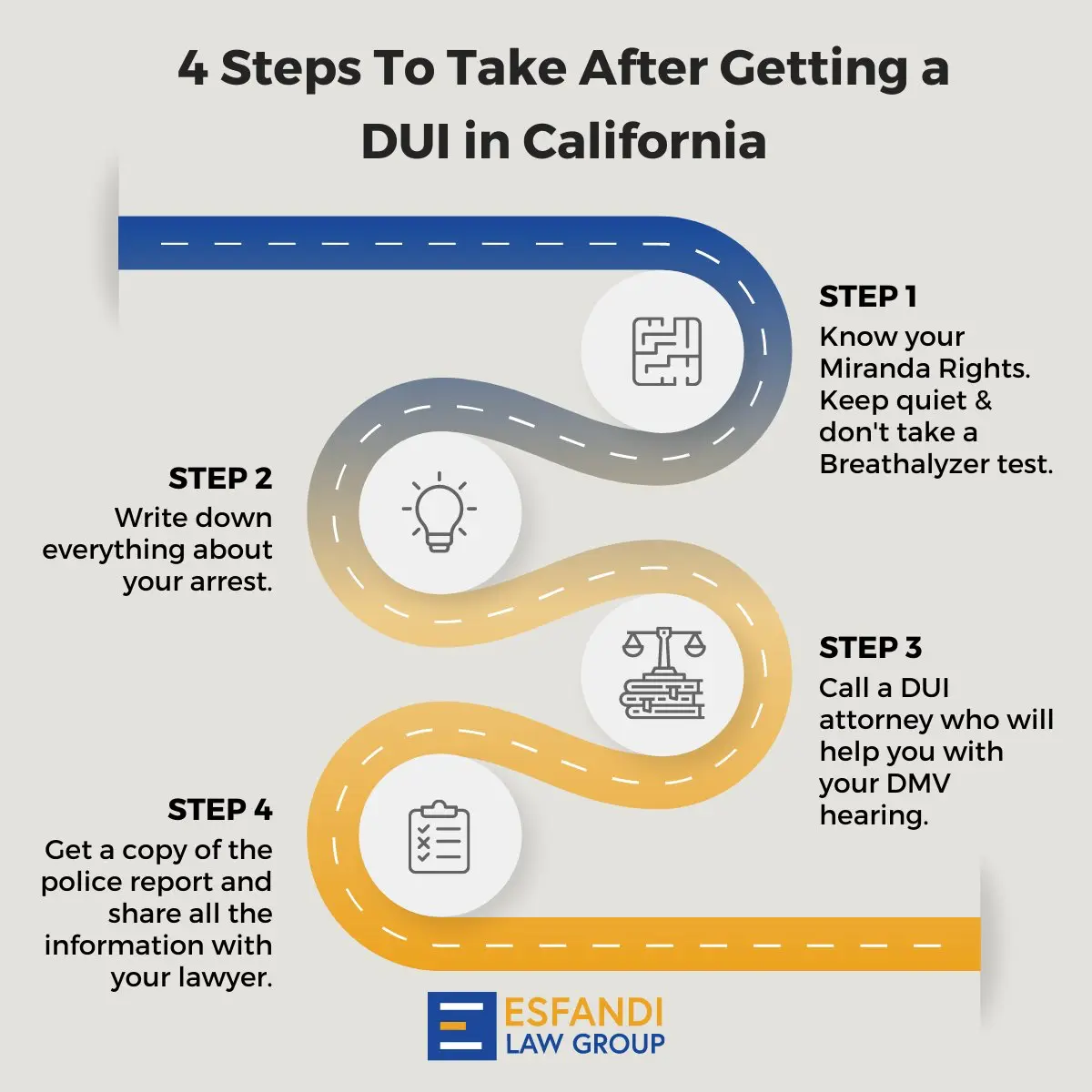DUI Defense
Los Angeles DUI Defense Lawyer


DUI Lawyer in Los Angeles
You never thought it could happen to you. One moment, you’re heading home after a night out, and the next, flashing lights fill your rearview mirror. The police report says you were over the limit, but you know there’s more to the story. Breathalyzers fail, officers make mistakes, and now your freedom and future hang in the balance. But a DUI charge is not the end of the road—it’s the beginning of your fight for justice. A skilled Los Angeles DUI defense attorney can protect your rights and help you navigate the legal process.
At Esfandi Law Group, we understand what’s at stake. Seppi Esfandi, a UCLA School of Law graduate with over 23 years of experience, has successfully defended countless DUI cases. Whether it’s your first offense or a repeat charge, our team will work passionately to build a strong defense, challenge evidence, and pursue the best possible outcome for you.
The clock is ticking. Contact Esfandi Law Group today for a confidential consultation and take the first step toward protecting your future.
Hire an Experienced Los Angeles DUI Trial Lawyer
Seppi Esfandi is a Top-Rated Los Angeles DUI attorney that’s dedicated to defending your rights. Esfandi Law Group has obtained favorable and positive outcomes in a wide range of California DUI Cases for over 22 years. We carefully examine every DUI case to identify any and all substantive and procedural weaknesses and challenges. With focus on the evidence, police behavior, testing, timing, witnesses and driver’s side of the story, Seppi utilizes and formulates a vigorous, personalized representation to accomplish the best possible outcome.

Defining a Los Angeles DUI Charge
Under Vehicle Code 23152(a) VC, a person can be charged with driving under the influence of alcohol even if there is no evidence of a blood alcohol content (BAC) of 0.08 percent or higher. There are various reasons why someone may face DUI charges in these situations. For instance, the chemical test results may still be pending at the time the case is charged, the driver may have refused chemical testing, or the driver may be under the legal limit but exhibiting signs of intoxication.
To prove that the defendant has committed the crime of driving under the influence of alcohol, the prosecutor must establish the following elements:

1. The defendant drove a vehicle.
2. When the defendant drove, they were under the influence of alcohol.
Being “under the influence” means that the person’s mental or physical abilities are impaired to the extent that they are no longer able to drive with the caution of a sober person under similar circumstances. It is important to note that the manner in which a person drives is not sufficient evidence of being under the influence, although it can be a relevant factor.
In order to stop a vehicle, a law enforcement officer must have probable cause that the driver is violating the law. This typically involves an independent violation of the Vehicle Code, such as speeding or improper lane changes. Mere suspicion or speculation that the driver may be drunk or impaired is not sufficient grounds for a traffic stop.
During a traffic stop, an officer may observe various symptoms of intoxication and may request the driver to perform field sobriety tests to determine their level of impairment. If the officer has reasonable suspicion that the driver is under the influence, they may request a breath sample on a Preliminary Alcohol Screening (PAS) device or proceed to arrest the driver on suspicion of DUI. Refusal to submit to chemical testing can result in additional charges.
Why Does Choosing the Right Los Angeles DUI Defense Attorney Matter
Not all DUI cases are the same. California has some of the toughest DUI laws in the country, and without the right legal defense, you could face severe penalties. Working with an experienced Los Angeles DUI defense attorney can make all the difference.
Here’s what an Esfandi Law Group drunk driving defense attorney brings to your case:
- Knowledge of DUI laws—California DUI laws are complex, but our seasoned attorneys understand the nuances and how to challenge them;
- Experience in courtroom defense—from cross-examining officers to exposing faulty breathalyzer tests, our skilled advocates know how to dismantle the prosecution’s case;
- Negotiation skills—our attorneys have strong negotiation skills and can secure plea deals, sentence reductions, or even a case dismissal; and
- Tailored defense strategies—every case is different, so our skilled DUI defense attorneys craft legal strategies based on the specifics of your arrest and evidence.
Esfandi Law Group has a proven track record of securing reduced charges, case dismissals, and favorable outcomes for clients facing DUI allegations. Our deep knowledge of California DUI laws and aggressive defense strategies give our clients the advantage they need in court. The prosecution is already building its case against you, and every moment without a strong defense puts you at a disadvantage. We can challenge the charges, protect your rights, and give you the best possible shot at a favorable outcome.
What Are DUI Charges in California?
California law takes DUI charges seriously, and penalties can be severe. Here’s a breakdown of what you might be facing:
- First-time DUI offense—a first-time DUI conviction can result in fines of up to $2,000, a six-month license suspension, mandatory DUI education programs, and possible jail time;
- Second DUI offense—a second conviction within ten years leads to increased fines, a two-year license suspension, court-ordered alcohol treatment programs, and potential jail time;
- Felony DUI charges—if a DUI results in injury or death, or if the driver has three or more prior DUI convictions, it may be charged as a felony and lead to years in state prison with severe financial penalties;
- Underage DUI—even a .01% BAC for drivers under 21 can result in an automatic license suspension and mandatory DUI education; and.
- Commercial DUI—commercial drivers face stricter regulations, and a DUI conviction can result in job loss, lengthy license suspensions, and steep fines.
In short, a DUI charge can turn your life upside down. The charge stays on your record for 10 years and can impact employment, insurance rates, and future opportunities. At Esfandi Law Group, we aggressively fight DUI charges, working to keep your record clean and your future intact. Our firm understands how to challenge the prosecution’s evidence and explore every possible legal defense.
Your defense starts the moment you hire the right lawyer. Don’t wait—your future is too important to leave to chance.
DUI and Drug Influence in California
Driving under the influence does not only refer to alcohol. In California, DUI laws also apply to drug impairment, including both illegal substances and prescription medications. Under California Vehicle Code §23152(f), it is illegal to operate a motor vehicle while under the influence of any drug, even if legally prescribed.
Law enforcement uses Drug Recognition Experts (DREs) and may request blood tests to confirm the presence of drugs. However, unlike alcohol-related DUIs, drug DUIs don’t have a clear-cut “legal limit,” making these cases more subjective and potentially more defensible.
Consequences of a drug-related DUI may include:
Driver’s license suspension
Mandatory DUI education programs
Fines, court costs, and probation
Possible jail time, especially for repeat offenses
A skilled Los Angeles DUI attorney can challenge the reliability of drug testing, the arresting officer’s qualifications, and the circumstances of the traffic stop to help mitigate or dismiss charges.
DUI Involving Accidents or Injuries
When a DUI results in an accident—especially one causing injury—the stakes increase dramatically. Under California Vehicle Code §23153, a DUI that causes bodily harm to another person may be charged as a felony DUI, even for a first-time offender.
Penalties can include:
Significant prison time (up to 4 years or more)
Enhanced fines
Restitution to victims
A permanent criminal record
Additionally, victims may file civil lawsuits for damages, including medical expenses, lost wages, and pain and suffering. This dual threat—criminal and civil—requires a robust legal strategy.
A seasoned DUI attorney in Los Angeles will not only work to challenge the DUI charge itself but also help limit exposure to civil liability by scrutinizing police reports, witness statements, and accident reconstruction evidence.
Expungement of DUI Convictions in California
A DUI conviction can follow you for years, affecting your ability to secure housing, jobs, and loans. Fortunately, California law provides a path to expunge certain DUI convictions under Penal Code §1203.4, as long as you have successfully completed probation and met all sentencing requirements.
Benefits of DUI expungement include:
The conviction is set aside, and your case is dismissed
You can legally say you were not convicted of a crime (in most circumstances)
Improved employment and housing prospects
However, expungement does not remove the DUI from your DMV record and will not reinstate driving privileges. It also does not prevent the DUI from being used as a prior offense if you’re charged with another DUI in the future.
A knowledgeable Los Angeles DUI attorney can guide you through the expungement process, improving your long-term legal and personal prospects.
Immigration Consequences of a DUI Conviction
For non-U.S. citizens, a DUI conviction can have severe immigration consequences. While a single misdemeanor DUI typically does not result in deportation, circumstances like:
Driving without a license
DUI with a child in the car
Multiple DUI convictions
DUI involving injury or death
…can be considered “crimes involving moral turpitude” or aggravated felonies, especially when paired with other charges like drug possession or resisting arrest. These can lead to:
Denial of a green card
Visa revocation
Removal (deportation) proceedings
Consulting an experienced Los Angeles DUI attorney who understands the intersection of criminal and immigration law is essential to protecting your legal status in the U.S. Your attorney may be able to negotiate for lesser charges or alternative sentencing that avoids immigration pitfalls.
What to Expect When Facing a DUI in Los Angeles
Many people get behind a motor vehicle, assuming they are in perfect condition to drive. However, the law does not always agree. Los Angeles County takes DUI cases very seriously and has some of the harshest penalties in the nation. The maximum legal blood alcohol concentration (BAC), while operating a motor vehicle, is 0.08%. If you exceed this number and are pulled over, you will be arrested and face serious consequences. Luckily, an experienced DUI attorney can help you avoid the steep penalties involved with a DUI. Here is an overview of what to expect:

Arrest
After 30 days of your arrest, your license will be suspended unless you request a hearing with the DMV to try to intervene within 10 days

Arraignment
You will face a criminal proceeding that will begin with an arraignment, in which the charges against you will be read to you. You will then enter your plea of “guilty” or “not guilty”. However, you should never plead guilty unless an attorney advises you to do so. Your attorney will then attempt to negotiate a favorable outcome, without needing to go to trial.

Pre-trial and Trial

Possible Dismissal

Not Guilty/Plea Bargain/Plea Bargain
Chemical Testing and Timing is Crucial
Since Breathalyzer tests are quite accurate, readings of 0.08% or higher often result in a guilty verdict or conviction of the charges. If you are at risk, only take the blood test or the urine test.
So once again, if you’re drunk, DO TAKE THE TEST, but only take the blood or urine test.
Different substances can impact a driver in a multitude of ways, such as one’s judgment, alertness, concentration, motor skills, etc. Marijuana, ecstasy, LSD, Cocaine or virtually any recreational drug may affect one’s driving ability according to California law. For drivers suspected of drug-impaired driving, drug testing screens are typically performed in laboratories so that the results can be admissible in evidence during the trial. Chemical tests performed usually include blood or urine.
Even over-the-counter or prescription medicines may affect your ability to drive. Be sure and tell your attorney if you are taking any of these medications.
Chemical testing is a key issue. Accused drunk drivers often fear that if the test results are above the legal limit, they are inevitably guilty. However, there are many challenges to the validity of blood and urine tests.
An experienced Los Angeles DUI lawyer, such as Seppi Esfandi, has an arsenal of proven strategies to attack the results of chemical tests.
Will I Lose My Driver’s License?
If convicted, you may lose your license for a period of time. There are three main kinds of driver’s license suspensions and this includes:
Administrative Suspension
After 30 days of your arrest, your license will automatically be suspended. This process can be intervened by requesting a DMV hearing within 10 days of your arrest. Your chances of success will increase with the presence of an experienced attorney.
Full Suspension
If you are convicted of a DUI, your driver’s license could be revoked. During this period of suspension, you cannot operate a motor vehicle.
License Restriction
These penalties are difficult to deal with. It is vital to choose an experienced and well-informed Los Angeles criminal defense attorney to assist in your case. Your lawyer can help you in a multitude of ways. This includes stopping the administrative suspension, making sure you understand the requirements needed to get your license reinstated, etc.
How Does a Los Angeles DWI Lawyer Defend My Case?
Every DUI case differs, but a strong defense strategy can mean the difference between a conviction and a dismissal. Our team at Esfandi Law Group will evaluate every angle of your case to find weaknesses in the prosecution’s arguments.
Here are some common defenses we use:
- Challenging the traffic stop—if the police pulled you over without reasonable suspicion, the judge could dismiss your case;
- Breathalyzer and blood test errors—faulty breathalyzers, improper testing procedures, and mishandled blood samples can lead to inaccurate results;
- Lack of probable cause—if law enforcement did not have legal grounds to arrest you, your case could be thrown out;
- Medical conditions and external factors—certain medical conditions, diets, and even mouthwash can cause false positives on breath tests; and
- Rising BAC defense—your blood alcohol concentration (BAC) could have been under the legal limit while driving but increased before testing.
Every case has unique opportunities for defense. A skilled Los Angeles DUI lawyer at Esfandi Law Group will identify and use them to your advantage.
What Does a Los Angeles DUI Defense Lawyer Suggest I Do After a DUI Arrest?
The steps you take immediately after an arrest can affect the outcome of your case. Here’s what you should do:
- Remain silent—anything you say can be used against you, so politely decline to answer questions without your attorney present;
- Request an attorney—contact us as soon as possible and don’t answer questions until you speak to them;
- Document everything—write down details about your arrest, including interactions with the police and any testing procedures; and
- Request a DMV hearing—after a DUI, you have 10 days to challenge your license suspension.
Working with a Los Angeles DUI Defense Lawyer at Esfandi Law Group can make a significant difference in your case. Taking immediate action is key to protecting your rights.
Frequently Asked Questions
Can I Refuse a Breathalyzer Test in California?
Yes, but refusal can lead to automatic license suspension and harsher penalties under California’s implied consent law.
How Long Does a DUI Stay on My Record?
A DUI conviction remains on your record for 10 years and may impact employment and insurance rates.
Can I Get My DUI Charges Reduced or Dismissed?
Yes, with the right defense. Many DUI cases result in reduced charges or dismissals, especially if there were procedural errors.
We’re Here to Help
Here are three things a good DUI defense attorney can do:
Have them dropped
Now, while this is not easy to do, in some cases, your defense lawyer may be able to get your DUI charges dropped before you even get to trial. They make this possible by getting key evidence thrown out. Since the burden of proof falls on the prosecutor, if the key evidence is thrown out, there is no case.
Have them dismissed
Your DUI defense attorney can get the case dismissed by finding flaws the prosecutor has during the trial. If your lawyer can discredit the evidence enough, they can ask the judge to dismiss the case.
Have them reduced
Building a Strong DUI Defense
In some cases, the prosecution may be willing to negotiate a reduced charge. This could include a wet reckless charge, or dry reckless charge, which are substantially lesser offenses than a standard DUI. Your attorney will advocate on your behalf to secure the best possible outcome, whether that’s a dismissal, a reduction in charges, a favorable plea agreement, or trial.
Reducing the Charge
If all else fails you can always reduce the charge to a wet reckless or dry reckless via DUI plea bargaining. The most common plea reached is to reduce the California DUI charge to one of the following:
- “wet reckless” charge (California DUI Vehicle Code § 23103 per § 23103.5);
- “dry reckless” charge (California DUI Vehicle Code § 23103); and
- “exhibition of speed” charge (California DUI Vehicle Code § 23109(c)).
Each of these reduced charges carries with them a reduction in penalties as well.
Hire a Los Angeles DUI Lawyer
Esfandi Law Group is known for delivering real results, securing reduced charges and case dismissals for countless clients facing DUI allegations. As a former Deputy Public Defender, Seppi Esfandi has spent years inside the courtroom defending individuals against serious criminal charges and mastering the intricacies of DUI law. With over 23 years of experience, he knows how to navigate the complexities of California DUI law and expose weaknesses in the prosecution’s case.
At Esfandi Law Group, we protect your rights and fight aggressively on your behalf. Our firm’s client-centered approach means you will receive personalized legal strategies tailored to your situation, ensuring the best possible outcome. Whether it’s negotiating for reduced charges, challenging evidence, or representing you in court, we are here to help. Contact us now for a consultation.
Need a Los Angeles Drunk Driving Lawyer?
Attorney Seppi Esfandi can provide the guidance of a Certified Expert in California DUI Cases who has over 23 years of practice defending all types of DUI and criminal cases.

